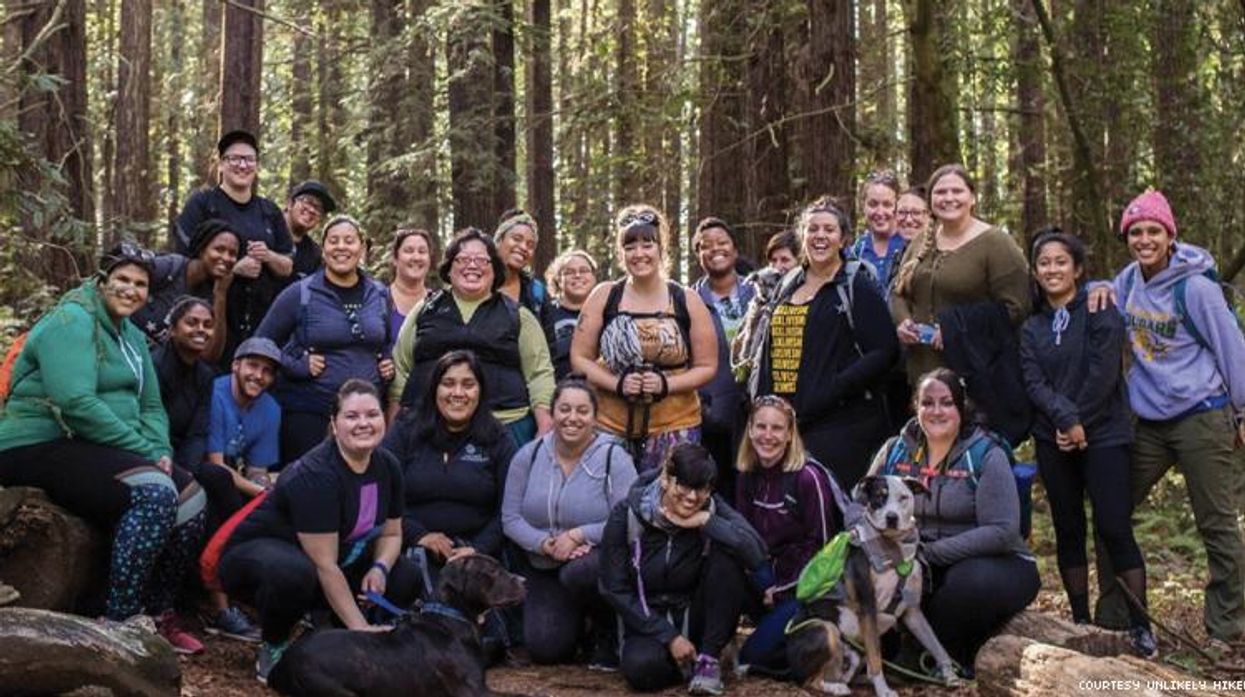Print Issue
These Unlikely Hikers Are Claiming Space Outdoors

Nontraditional adventure enthusiasts — queer, disabled, fat, BIPOC — are forccing an industry to recognize that everyone belongs outside in nature.
February 23 2022 4:00 AM EST
By continuing to use our site, you agree to our Privacy Policy and Terms of Use.

Nontraditional adventure enthusiasts — queer, disabled, fat, BIPOC — are forccing an industry to recognize that everyone belongs outside in nature.
The great outdoors are no longer closed to the LGBTQ+ community. Queers aren’t the only ones who are getting back to nature. Those often depicted as uninterested in or even hostile to outdoor adventure travel — disabled people, fat activists, and people of color — are getting outside in growing numbers. And they’re no longer waiting for the industry to catch up, instead creating their own outdoor spaces and accessible experiences.
A glance at social media hashtags demonstrates the rising popularity of outdoor experiences among those who might have felt unwelcome or intimidated before: #latinaswhohike, #allwomenoutdoors, #unlikelyhikers, #dykeswhohike, #womenwhowander, #disabledhikers, #climbersofcolor, and #fatandoutdoorsy are just a few.
“We’re creating our own outdoor narrative,” Jenny Bruso told sister publication The Advocate in 2021. “One that fits all of us.”
The author and podcaster behind Unlikely Hikers (@UnlikelyHikers), Bruso describes herself as a “white, queer, fat, femme writer and hiker” who is “bringing body liberation outdoors” one hike at a time.
“Outdoor culture is still very geared toward predominantly white, cisgender, heterosexual people,” she explained. “That may sound bizarre to someone who’s always felt a natural sense of access to outdoor recreation, but for those of us who don’t, it puts us in a position of feeling wary of our safety on trail.”
Existing at the intersection of racism and homophobia, queer people of color have been historically shut out of outdoor experiences. Local parks were rarely developed in lower-income or Black neighborhoods, and National Parks and Forests are often remote, difficult to reach, and located in more conservative (and potentially hostile) regions of the country. Unfortunately, even when they do get to a park, forest, or open space, Black and Latinx people still frequently encounter systemic racism, bigotry, and discrimination.
But through Unlikely Hikers and other groups, a growing network of queers are finding ways to make the great outdoors more accessible to others, regardless of size, gender, color, or ability. Social media groups provide the perfect opportunity for newbies to learn and connect. And groups welcoming nontraditional folks are popping up all over the country.
Unlikely Hikers is also having an unexpected impact beyond visibility and engagement — it is changing the industry that has ignored nonconventional hikers for so long. In 2021, Bruso announced that she’d been working with Gregory Mountain Products for nearly two years on “the first ever line of plus-size backpacks.”
“This isn’t just a first for Gregory,” Bruso wrote on jennybruso.com when the backpacks went on sale. “It’s a first across the entire outdoor industry.”
In a similar partnership, the hiking boot company Merrell redesigned the brand’s popular Zion shoe, to, as the company says, “encourage all types of people to get out there and be part of the joyful movement.”
The speed in which these products sell out is an indication of the need and market for outdoor gear that is built for plus-sized bodies, and it’s a hopeful sign that the industry is finally waking up and expanding who it makes gear for.
This piece, initially titled Taking It Outside, originally ran in Out Traveler print magazine, as part of our special coverage of oursider travelers. The Winter 2022 issue is now available on newsstands.
Managing Editor at OutTraveler. Also write for Out, The Advocate, and Plus magazines.
Managing Editor at OutTraveler. Also write for Out, The Advocate, and Plus magazines.